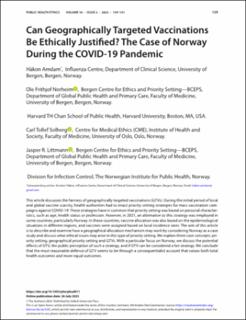| dc.contributor.author | Amdam, Håkon | |
| dc.contributor.author | Norheim, Ole Frithjof | |
| dc.contributor.author | Solberg, Carl Tollef | |
| dc.contributor.author | Littmann, Jasper | |
| dc.date.accessioned | 2023-09-29T11:35:34Z | |
| dc.date.available | 2023-09-29T11:35:34Z | |
| dc.date.created | 2023-06-19T09:46:29Z | |
| dc.date.issued | 2023 | |
| dc.identifier.issn | 1754-9973 | |
| dc.identifier.uri | https://hdl.handle.net/11250/3093104 | |
| dc.description.abstract | This article discusses the fairness of geographically targeted vaccinations (GTVs). During the initial period of local and global vaccine scarcity, health authorities had to enact priority-setting strategies for mass vaccination campaigns against COVID-19. These strategies have in common that priority setting was based on personal characteristics, such as age, health status or profession. However, in 2021, an alternative to this strategy was employed in some countries, particularly Norway. In these countries, vaccine allocation was also based on the epidemiological situations in different regions, and vaccines were assigned based on local incidence rates. The aim of this article is to describe and examine how a geographical allocation mechanism may work by considering Norway as a case study and discuss what ethical issues may arise in this type of priority setting. We explain three core concepts: priority setting, geographical priority setting and GTVs. With a particular focus on Norway, we discuss the potential effects of GTV, the public perception of such a strategy, and if GTV can be considered a fair strategy. We conclude that the most reasonable defence of GTV seems to be through a consequentialist account that values both total health outcomes and more equal outcomes. | en_US |
| dc.language.iso | eng | en_US |
| dc.publisher | Oxford University Press | en_US |
| dc.rights | Navngivelse-Ikkekommersiell 4.0 Internasjonal | * |
| dc.rights.uri | http://creativecommons.org/licenses/by-nc/4.0/deed.no | * |
| dc.title | Can Geographically Targeted Vaccinations Be Ethically Justified? The Case of Norway During the COVID-19 Pandemic | en_US |
| dc.type | Journal article | en_US |
| dc.type | Peer reviewed | en_US |
| dc.description.version | publishedVersion | en_US |
| dc.rights.holder | Copyright 2023 The Author(s) | en_US |
| cristin.ispublished | false | |
| cristin.fulltext | original | |
| cristin.qualitycode | 1 | |
| dc.identifier.doi | 10.1093/phe/phad011 | |
| dc.identifier.cristin | 2155649 | |
| dc.source.journal | Public Health Ethics | en_US |
| dc.source.pagenumber | 139-151 | en_US |
| dc.identifier.citation | Public Health Ethics. 2023, 16 (2), 139-151. | en_US |
| dc.source.volume | 16 | en_US |
| dc.source.issue | 2 | en_US |

